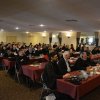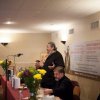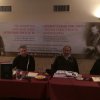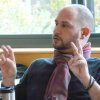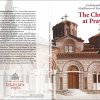The Sts. Sebastian & Mardarije Orthodox Institute Begins its Work - Day One
Monday, February 16, 2015 - Day One
Hosted by His Grace, Bishop Maxim, of the Serbian Orthodox Diocese of Western America, at St. Sava Serbian Orthodox Church in Phoenix, Arizona, the Sts. Sebastian and Mardarije Orthodox Institute began on Monday evening with the celebration of a Doxology service, followed immediately by Vespers, presided over by His Grace, Bishop Longing of the Serbian Orthodox diocese of the Mid-West. Attending the service was His Grace, Bishop Maxim and the clergy brotherhood of the Diocese of Western America. The event was especially marked by the presence of His Grace, Bishop Atanasije, retired bishop of Herzegovina. Vespers was followed by dinner. A wine and cheese tasting then gave guests the opportunity to meet Bishop Atanasije in person and receive his blessing. The assembly was also blessed by the presence of Bishop Daniel of Santa Rosa, newly-consecrated assistant bishop of the OCA’s diocese of the West. The retreat, which claims the patronage of Sts. Sebastian and Mardarije, will include multiple sessions over several days which will draw from the wisdom of Bishop Atanasije and his lifelong witness to the living tradition of the Orthodox Faith and life in Christ.
.The first full day of the Institute began Tuesday morning with the celebration of Orthros, followed by refreshments and the first session of the institute; Gospel, Revelation, and the Living Tradition. The session was chaired by special guest, His Grace, Bishop Atanasije, and was moderated by Bishop Maxim and Fr. Predrag Samardzic. As will be the case with all the sessions at the Institute, the content focused on the lifelong work and experience of Bishop Atanasije. The session provoked lively discussion and those in attendance received not only his Grace’s wisdom, but were also touched by his wit and abundant joy. In the afternoon, two more sessions were attended which focused on the topics of Freedom, Spiritual Warfare and the Cross, and Eschatology and Theosis according to St. Maximus. The sessions were again led by Bishop Atanasije, and were moderated by Abbot Damascene, Fr. Russell Radoicich and Deacon Zoran Aleksic, and Fr. Darko Spasojevic, Deacon Marko Bojovic and Deacon Daniel Kirk respectively. Again both sessions included significant discussion among participants, in which Bishop Atanasije guided all to see both the greater meaning in the topics as well as an understanding of their relationship to the everyday existence of an Orthodox Christian. Guests then enjoyed dinner before celebrating Vespers, presided over by his Grace, Bishop Daniel. Vespers was followed by the keynote address of the Institute, given by Bishop Atanasije, and moderated by Bishop Longin and Ivan Vuksanovic, which focused on the topic of The Eschata in Our Daily Life.
Session I: Gospel, Revelation & the Living Tradition
Moderators: His Grace, Bishop Longin, His Grace, Bishop Maxim, Fr. Predrag Samardžić
Session II: Freedom, Spiritual Warfare & Cross
Moderators: Abbot Damascene, Fr. Russell Radoicich, and Deacon Zoran Aleksić
Session III: Eschatology and Theosis according to St. Maximus the Confessor
Moderator: Fr. Darko Spasojević and Deacon Marko Bojović, and Deacon Daniel Kirk
Keynote Address by His Grace, Bishop Atanasije, The Eschata in Our Daily Life
Moderator: His Grace, Bishop Longin and Ivan Vuksanović
Sts. Sebastian and Mardarije Orthodox Institute - Day Two
Tuesday, February 17, 2015 - Day Two
The second day of the Institute began again with the celebration of Orthros. The service was chanted in the beautiful, monophonic Serbian melodies in both English and Slavonic. Session IV of institute featured Bishop Atanasije and was moderated by Fr. Nicholas Ceko, Fr. Djokan Majstorovic and Lazar Supic. The theme of the session, New Pascha-Divine Liturgy in the Land of the Living, addressed the liturgical dimension to all of life. Man is most himself as he lives in and through the liturgy, while consecrating the world around him into mystery of Christ. Questions addressed issues pertaining to the the Liturgy and how it’s celebrated as well as how to correctly approach renewal/restoration in the liturgical life of the Church.
After a brief break for lunch and rest, the fifth session began, which addressed the topic of Synodality and Canonical Tradition. As bishop Atanasije indicated, the canonical tradition of Orthodoxy flows out of the worship of the Church, and especially out of the Divine Liturgy. Even the three-fold ordained ministry of the Church, that of Bishop, Priest, and Deacon, arises from the mystery of the life of the Christ as it’s experienced within the liturgy. Canons, too, provide continuity to our worship and safety to the faithful as we attempt to navigate the trials of this present world. The session was adeptly moderated His Grace, Bishop Maxim, as well as Fr. Dobrivoje Milunovic and Fr. Zivojin Jakovljevic.
Session VI was moderated by Mother Michaila of St. Paisius Monastery, along with Sister Xenia and Miroslav Popovic. After beautiful introductions from the moderators, Bishop Atanasije spoke on the topics of Holiness and Responsibility. Those in attendance were given a special glimpse into the depth of spirituality present within the Serbian Orthodox peoples. Stories from the lives of such spiritual giants as Sts. Nikolai Velimirovic and Justin Popovic illustrated the seriousness which our Faith requires of us, and yet the conveyed the hopefulness of facing these challenges in light of God’s abundant mercy communicated through the liturgy and His Saints.
Dinner and Vespers were followed by a fantastic performance by the “Breze” group, the talented local youth, who entertained all with traditional dance and songs from the rich Serbian folk tradition. Finally, guests were formally introduced to Sabastion Press’s stunning new English edition of The Christian Heritage of Kosovo and Metohija. The book, which is based on an earlier volume published in Serbia in the 1980’s, reveals the very heart of Christian Serbia. From its elaborate detailing of the cultural traditions and history of the region to its beautiful pictures of Kosovo’s churches, monasteries and villages, the book provides a clear picture of Kosovo’s true heritage and stands in sharp contrast to the revisionist histories which are so common in the western circles.
Session IV: New Pascha–Divine Liturgy in the Land of the Living
Moderators: Fr. Nicholas Čeko, Fr. Djokan Majstorović, and Lazar Supić
Session V: Synodality and Canonical Tradition
Moderator: His Grace, Bishop Maxim, Fr. Dobrivoje Milunović, and Fr. Živojin Jakovljević
Session VI: The Return to Wonder: on Holiness and Responsibility
Moderator: Mother Michaila, Sister Xenia, and Miroslav Popović
Christian Heritage of Kosovo & Metohije, Presentation by Bishop Atanasije
The Sts. Sebastian & Mardarije Orthodox Institute Completes its Work - Day Three
Thursday, February 19, 2015 - Day Three
On Thursday morning, the third full day of the institute began with the celebration of the Divine Liturgy. The Liturgy was served by Bishop Atanasije and concelebrated by Bishop Daniel of Santa Rosa, along with the clergy brotherhood. Following the Liturgy, clergy and faithful were treated to an excellent breakfast before beginning the first session.
Session VII addressed the topic of Democracy and Human Rights in the Light of the Church as seen from within the Orthodox Faith. In the talk, Bishop Atanasije outlined what these terms do and do not mean from an Orthodox standpoint, while juxtaposing them with common misconceptions concerning these topics in the West. Session moderators were Fr. Seraphim Baltic, Fr. Aleksander Vlajkovic and Nenad Djordjevic. In session VIII, Bishop Atanasije spoke on the concept of Orthodox Ecumenism. Drawing from his vast experience over the last several decades serving as a bishop in the Serbian Orthodox Church, His Grace stated that we are all called to be ecumenist in the sense of meeting our neighbors and revealing Orthodoxy through genuine love. On the other hand, we must be care in formal theological dialogue, he explained, to not be controlled by pre-existing agendas. We must be a light on a hill without compromising the Faith which we have kept and must continue to keep. Session VIII was moderated by Fr. Predrag Bojovic, Fr. Ljubisa Brnjos.
Session IX, the last of the institute, focused on the Kosovo Covenant. The session, which was moderated by Fr. Dragomir Tuba and Fr. Blasko Paraklis, dealt with the unique values which developed among the Serbian people. These values, which include freedom, responsibility, and love of neighbor, are the foundational principles which enabled the Serbian people to build the Christian culture of Kosovo. This heritage is silently witnessed to in the many Churches and monasteries which decorate the stunning landscape of Kosovo to this very day. Thursday evening vespers was held at St. Nicholas Serbian Orthodox Church, were the church’s magnificent frescos were highlighted by the beautiful chanting of the clergy brotherhood. A generous meal followed vespers during which Bishop Atanasije spoke on Orthodox Christianity in America. Once again, His Grace moved the audience by speaking into the lives of all of us who struggle to keep the Faith which can, at times, feel so apposed by the world around. And yet, the American people are a people of generous heart with an openness to the truth. By living as conscientious Orthodox Christians, our Lord will use us to illumine those around us and call even this country to the Faith ‘once and for all delivered to the saints.’
On Friday morning, Bishops and clergy brotherhood, departed for a small day-trip to St. Anthony’s Orthodox Monastery, just outside the Phoenix metro area. They were met at the entrance to the monastery by Geronda Paisius, abbot of St. Anthony’s, who personally escorted the group on a tour of the Prophet Elias Chapel. Lunch was served in the monastery trapeza, after which the group met and received the blessing of the Monastery’s beloved elder, Geronda Ephraim.
Session VII: Democracy and Human Rights in the Light of the Church
Moderators: Nenad Djordjević, Fr. Serafim Baltić
Session VIII: On Orthodox Ecumenism
Moderators: Fr. Predrag Bojović and Fr. Ljubisa Brnjos
Session IX: The Kosovo Covenant
Moderators: Fr. Dragomir Tuba and Fr. Blasko Paraklis
Keynote Address by His Grace, Bishop Atanasije, Orthodoxy in America

